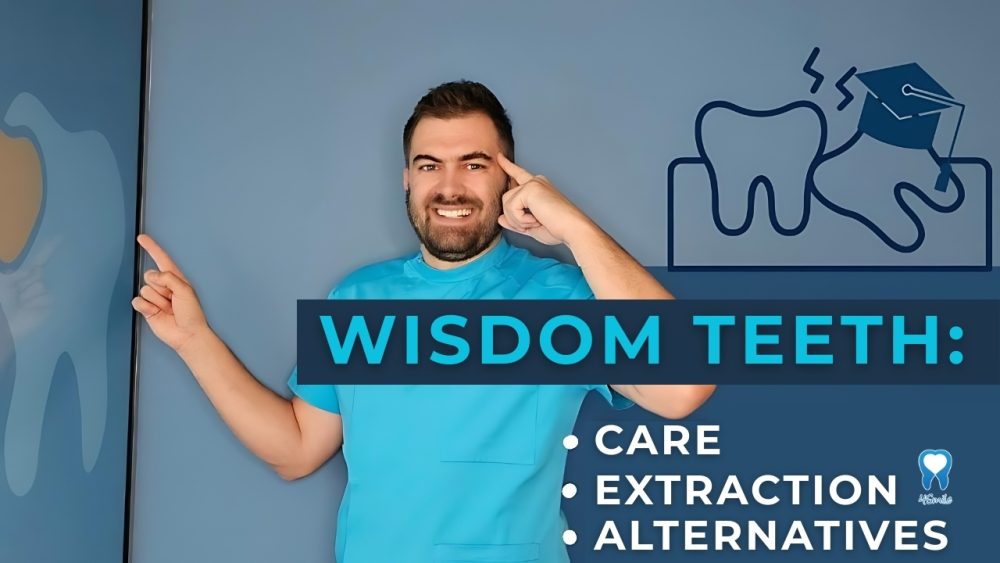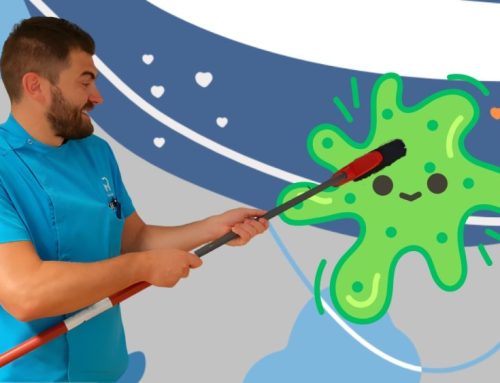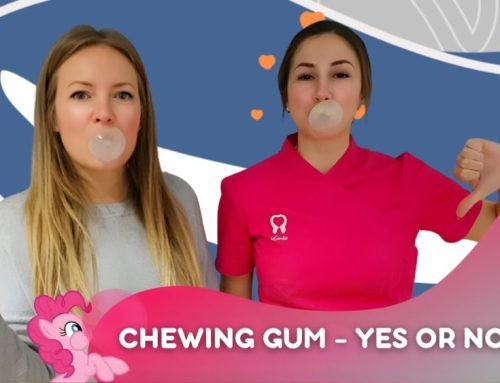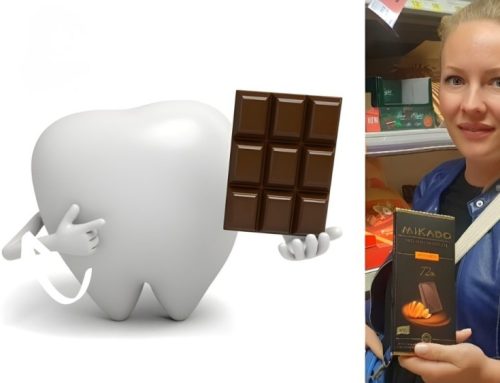Wisdom teeth, also known as third molars, are the last set of molars that typically emerge in late adolescence or early adulthood.
They are sometimes referred to as “wisdom teeth” due to the idea that they appear at an age when people are presumed to be wiser. However, these late-erupting teeth often come with their own set of problems.
In this week’s blog from Dental Center 4Smile, we’ll cover everything you need to know about wisdom teeth: why they are often recommended for removal, and how to care for them if you decide not to extract them.
WHAT IS THE ROLE OF WISDOM TEETH?
You’ve probably heard that wisdom teeth are not useful, but is that really true?
In the distant past, wisdom teeth were important for our ancestors who ate coarse food. However, with the evolution of our diet and oral hygiene practices, wisdom teeth cause more complications than benefits for most people today.
While wisdom teeth can still serve as additional chewing surfaces, which is beneficial in the long run, they often lead to problems due to their late eruption and the limited space in the modern human jaw. Some common issues related to wisdom teeth include:
1. TOOTH IMPACTION:
Unlike other teeth, wisdom teeth are often impacted, meaning they don’t fully erupt vertically from the gum line and without obstruction. The growth path of wisdom teeth is often more horizontal than vertical. Due to the lack of space in the modern jaw, impacted wisdom teeth can collide with other teeth on their growth path, which usually results in significant pain and discomfort.
2. SPACE CROWDING IN THE JAW:
Limited space in the jaw can cause wisdom teeth to press against existing teeth, leading not only to discomfort but also to misalignment by crowding neighboring teeth.
3. INCREASED RISK OF INFECTION AND GUM DISEASE:
The difficulty of reaching wisdom teeth during regular oral hygiene makes them more prone to infections and gum disease.
As a result, cavities are more likely to develop on wisdom teeth, which can spread to adjacent teeth. The prolonged buildup of plaque on wisdom teeth leads to tartar formation, which triggers gingivitis and periodontitis.
Additionally, due to the complications of wisdom teeth eruption and the challenges in maintaining oral hygiene, dental abscesses and fistulas (pus-filled sacs that resemble pimples on the gums) can form more frequently.
BENEFITS OF WISDOM TOOTH EXTRACTION
Due to the potential problems associated with wisdom teeth, dentists often recommend their extraction as a preventive measure. Here are some reasons why wisdom tooth extraction is often recommended:
1. PREVENTIVE MEASURES:
While wisdom tooth extraction is not mandatory, it is often performed as a preventive measure to avoid potential future problems.
2. PAIN RELIEF:
As mentioned earlier, the eruption process of wisdom teeth can often become complicated, and it is not uncommon for wisdom teeth to take a long time to emerge due to these complications.
Extracting impacted or problematic wisdom teeth will relieve pain and discomfort.
Additionally, at Dental Center 4Smile, wisdom tooth extraction is a painless process!
The skilled staff and Dr. Ivan Antolković will provide local anesthesia, prescribe necessary medications, and give aftercare instructions to ensure a quick and successful recovery.
3. PREVENTING CROWDING:
When wisdom teeth don’t have enough room to emerge or grow incorrectly, they can press on neighboring teeth, causing overcrowding in the jaw. This overcrowding can damage or move other teeth, disrupting the alignment of multiple teeth in the jaw.
If your wisdom teeth are disturbing the alignment of your other teeth, extracting them will help preserve your smile.
4. PREVENTING INFECTIONS:
If your wisdom teeth are causing gum infections, removing them will reduce the risk of developing gum disease and other complications.
Although you can remove your wisdom teeth by choice, we recommend consulting with our dentist, Ivan Antolković, who will assess the need for extraction.
If you decide to proceed with wisdom tooth removal, here’s what you can expect:
THE WISDOM TOOTH EXTRACTION PROCEDURE
1. CONSULTATION:
To assess your wisdom teeth issue, Dr. Ivan Antolković will first examine your wisdom teeth and may refer you for an X-ray.
On your next visit, the X-ray you bring will be essential for correctly determining the growth position of your wisdom teeth, their current condition, and predicting the future growth path.
If you and your dentist agree that extraction is desired or necessary, the extraction process can proceed immediately.
2. ANESTHESIA:
In the first step, Dr. Ivan Antolković will ensure that the procedure is entirely painless.
You will receive a local anesthetic to numb the area around the tooth and ensure your comfort during the procedure.
3. EXTRACTION OF WISDOM TEETH:
Dr. Ivan Antolković will perform the extraction as quickly and efficiently as possible. This may involve cutting parts of the gum or dividing the tooth into smaller sections for easier removal.
4. RECOVERY:
After the procedure, Dr. Antolković will provide post-operative care instructions to help manage pain and ensure proper healing.
Recovery usually takes a few days to a few weeks.
KEEPING YOUR WISDOM TEETH
If your wisdom teeth are not causing complications or if the complications can be resolved with simpler procedures, you may decide to keep your wisdom teeth.
While wisdom teeth may not serve a significant purpose, like all teeth in the jaw, they help with chewing, contribute to speech, and maintain the natural structure of your jaw.
If you choose this option, it is crucial to take good care of your wisdom teeth to avoid any future complications!
Here’s how to care for your wisdom teeth:
1. REGULAR CHECKUPS:
Regular dental checkups are key to preventing tooth and gum diseases. You should visit the dentist at least once a year, and it is especially important not to miss regular checkups if you decide to keep your wisdom teeth.
As mentioned earlier, due to the difficult-to-reach and hidden position of wisdom teeth, the chance of not noticing potential cavities developing on your wisdom teeth is higher than with other teeth.
Pain is a symptom that may warn you of problems with your wisdom teeth, but pain typically occurs once the dental issue has already developed!
2. GOOD ORAL HYGIENE:
If you decide to keep your wisdom teeth, it is extremely important to enhance your oral hygiene routine!
Maintain thorough oral hygiene by brushing your teeth twice a day for two minutes, paying special attention to brushing your wisdom teeth.
Prevent plaque buildup between your teeth and around the gums surrounding the tooth by using a water flosser, interdental brushes, or dental floss at least once a day!
If you cannot brush your teeth, rinse your mouth with water temporarily!
This will help produce more saliva, which helps break down food remnants.
3. INCREASED ATTENTION TO SIGNS OF DISEASE:
If you miss regular checkups, pay close attention to any signs of dental disease.
Frequent signs of an already developed issue with wisdom teeth include pain, swelling, and signs of infection or gum disease around your wisdom teeth.
If you notice signs of pain, it is essential to visit your dentist as soon as possible since the problem will not resolve on its own.
Although symptoms may temporarily subside, the tooth will continue to decay!
4. ADAPTING YOUR DIET:
Adapting your diet helps support oral health, especially if you have additional teeth that need care! Avoid:
– Hard and crunchy foods, which could cause tooth fractures or gum injuries
– Sticky foods, which are highly conducive to cavity formation and difficult to remove
– Sweet foods and drinks, as cavity-causing bacteria feed on sugar
– Acidic foods and drinks, which cause enamel erosion and gradual tooth decay
5. ORTHODONTICS:
If wisdom teeth cause alignment issues, you may need orthodontic treatment to maintain proper dental positioning.
CONCLUSION:
In the world of oral health, wisdom teeth are a frequent cause for concern.
Although extraction is often recommended for several reasons, it’s crucial to make an informed decision in consultation with your dentist, Dr. Ivan Antolković.
If your wisdom teeth are not causing problems, they may still be useful as an additional chewing surface, reducing wear on surrounding teeth. With the right knowledge and care, wisdom teeth do not necessarily have to be a source of discomfort or dental issues.
Regardless of whether you decide to extract or keep your wisdom teeth, proper oral care and regular dental checkups are essential for maintaining a healthy, pain-free smile. So, take the first step – come to Dental Center 4Smile and let us help you achieve a beautiful smile!















